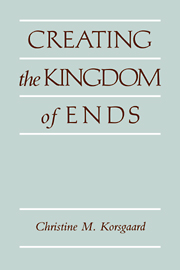Book contents
- Frontmatter
- Contents
- Introduction
- Abbreviations for Kant's works
- PART ONE KANT'S MORAL PHILOSOPHY
- PART TWO COMPARATIVE ESSAYS
- 8 Aristotle and Kant on the source of value
- 9 Two distinctions in goodness
- 10 The reasons we can share: An attack on the distinction between agent-relative and agent-neutral values
- 11 Skepticism about practical reason
- 12 Two arguments against lying
- 13 Personal identity and the unity of agency: A Kantian response to Parfit
- Bibliography
- Sources
- Other publications by the author
- Index
- Index of citations
8 - Aristotle and Kant on the source of value
Published online by Cambridge University Press: 05 June 2012
- Frontmatter
- Contents
- Introduction
- Abbreviations for Kant's works
- PART ONE KANT'S MORAL PHILOSOPHY
- PART TWO COMPARATIVE ESSAYS
- 8 Aristotle and Kant on the source of value
- 9 Two distinctions in goodness
- 10 The reasons we can share: An attack on the distinction between agent-relative and agent-neutral values
- 11 Skepticism about practical reason
- 12 Two arguments against lying
- 13 Personal identity and the unity of agency: A Kantian response to Parfit
- Bibliography
- Sources
- Other publications by the author
- Index
- Index of citations
Summary
THREE KINDS OF VALUE THEORY
In this paper I discuss what I will call a “rationalist” account of the goodness of ends. I begin by contrasting the rationalist account to two others, “subjectivism” and “objectivism.” Subjectivism identifies good ends with or by reference to some psychological state. It includes the various forms of hedonism as well as theories according to which what is good is any object of interest or desire. Objectivism may be represented by the theory of G. E. Moore. According to Moore, to say that something is good as an end is to attribute a property, intrinsic goodness, to it. Intrinsic goodness is an objective, nonrelational property of the object, a value a thing has independently of anyone's desires, interests, or pleasures.
The attraction of subjectivist views is that they acknowledge the connection of the good to human interests and desires. Most things that are good are good because of the interest human beings have in them, an interest that can be explained in terms of the physiological and psychological constitutions of human beings and the other conditions of human life. In Kantian language, we may say that just as means are “conditioned” goods because their value depends on the ends to which they are means, most of our ends are conditioned goods because their value depends on the conditions of human existence, and the needs and desires to which those conditions give rise.
- Type
- Chapter
- Information
- Creating the Kingdom of Ends , pp. 225 - 248Publisher: Cambridge University PressPrint publication year: 1996
- 2
- Cited by



